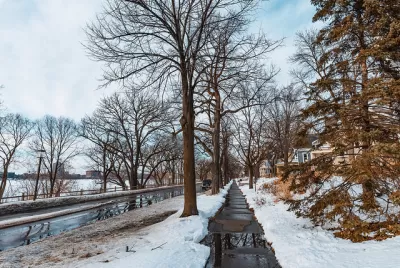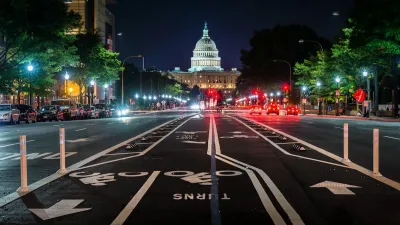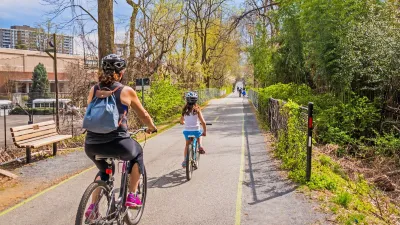Poor infrastructure can have powerful impacts on how different groups access resources and experience the public realm.

A panel of experts at the Shared Mobility Summit examined how poor infrastructure affects public health and dignity, reports Jeff McMahon. Neuroscientist Robin Mazumber pointed to hardships endured by the elderly and mentally ill: "[Poor infrastructure] caused loneliness. It contributed to a sedentary lifestyle." For Mazumber, a focus on universal design is key to making cities and the public realm more accessible and comfortable for all.
"At the heart of successful universal design is dignity, Mazumder said. When streets feel unsafe to cross, pedestrians have an undignified experience. When they feel unsafe to share, so do bicyclists." Mazumder points to "beg buttons" as one example of "undignified" urban design. In an example from Sweden, the government chose "to plough snow from sidewalks and bike paths first, instead of prioritizing streets" because "Sweden determined that 79 percent of its pedestrian injuries occurred during winter, and the overwhelming majority of those—69 percent—happened to women. An analysis found that women and children were more likely to be using icy sidewalks in winter than men, who were more likely to be commuting on ploughed streets." Injuries during wintertime went down by 50 percent.
"Infrastructure can also send discouraging messages to people who aspire to using alternative modes," as when unsafe roads prevent people from biking or walking safely or shared vehicles are tucked away in hard-to-find places. "The answer, which some UK governments have begun to pursue, is to put low-impact modes in the front, Roberts said, where they’re most visible and easiest to use."
Transportation systems, Zabe Bent, director of design for the National Association of City Transportation Officials argued, must be geared toward more than just getting people to and from work. "We just don’t think about access to food—and food security is huge—access to education," pointing out that only 30 percent of community colleges in the U.S. are near transit.
FULL STORY: How Infrastructure Decides Who Enjoys Dignity And Health

Alabama: Trump Terminates Settlements for Black Communities Harmed By Raw Sewage
Trump deemed the landmark civil rights agreement “illegal DEI and environmental justice policy.”

Planetizen Federal Action Tracker
A weekly monitor of how Trump’s orders and actions are impacting planners and planning in America.

The 120 Year Old Tiny Home Villages That Sheltered San Francisco’s Earthquake Refugees
More than a century ago, San Francisco mobilized to house thousands of residents displaced by the 1906 earthquake. Could their strategy offer a model for the present?

In Both Crashes and Crime, Public Transportation is Far Safer than Driving
Contrary to popular assumptions, public transportation has far lower crash and crime rates than automobile travel. For safer communities, improve and encourage transit travel.

Report: Zoning Reforms Should Complement Nashville’s Ambitious Transit Plan
Without reform, restrictive zoning codes will limit the impact of the city’s planned transit expansion and could exclude some of the residents who depend on transit the most.

Judge Orders Release of Frozen IRA, IIJA Funding
The decision is a victory for environmental groups who charged that freezing funds for critical infrastructure and disaster response programs caused “real and irreparable harm” to communities.
Urban Design for Planners 1: Software Tools
This six-course series explores essential urban design concepts using open source software and equips planners with the tools they need to participate fully in the urban design process.
Planning for Universal Design
Learn the tools for implementing Universal Design in planning regulations.
Clanton & Associates, Inc.
Jessamine County Fiscal Court
Institute for Housing and Urban Development Studies (IHS)
City of Grandview
Harvard GSD Executive Education
Toledo-Lucas County Plan Commissions
Salt Lake City
NYU Wagner Graduate School of Public Service





























